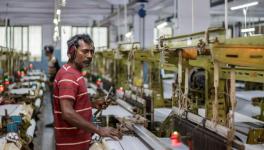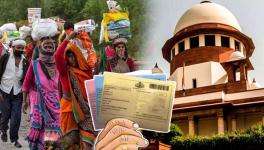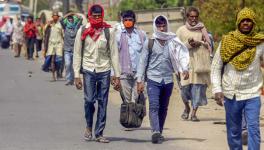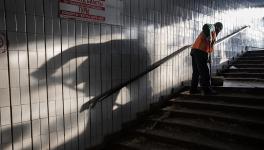Kerala: Govt. Fastracks Job Creation with Gulf Returnees Staring at a Bleak Future
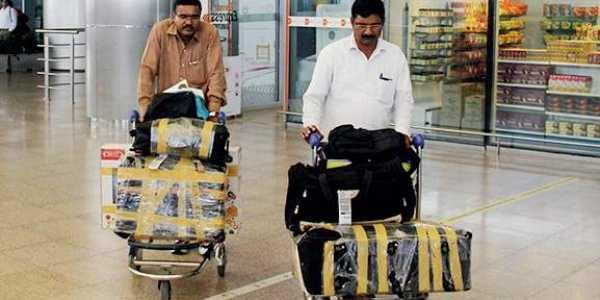
Image Courtesy: The New Indian Express
Ever since the COVID-19 pandemic hit, migrants stranded all over the world have been facing a heightened risk of the disease. Later, countries began repatriation missions to bring back stranded citizens. India too joined in with the Vande Bharat mission.
On May 7, the first Vande Bharat flight landed at the Cochin International Airport with 177 Keralites from Abu Dhabi. Of the Indian states, Kerala had reasons to be worried about their citizens. According to data from Non Resident Keralites Affairs (Norka) – a state department – 40 lakh Keralites live outside the country, most of whom are in countries in the Gulf region. According to research by the Centre for Development Studies, Trivandrum, nine out of ten Malayalee immigrants are in Gulf countries
In the initial period, the state government and Norka came up with a list to evacuate people. Priority had been given to pregnant women, people whose visa date had expired, elderly people, people who depend on Kerala for treatment and the like. Later, many others returned to the state. Though these people were relieved to return to their families, more than two months down the line, many are without secure jobs and a proper source of income.
Many of the expatriates who returned had lost their jobs due to the economic downturn on account of COVID-19.
Shelton Das, a 36-year-old man from Kerala, who was working at the sales section of a prominent real estate company in Doha, reportedly said: “We knew things were turning for the worse when my salary payment started to get delayed from February itself.”
“My wife, who is a nurse, also had February’s salary pending. Once COVID-19 struck, her clinic cut down her hours and days of work. It was an excuse to reduce her salary. My company terminated five of us within a week after that. We were stuck with two kids aged 4.5 and 1.5 years, my mother-in-law was also staying with us. We had already booked our tickets home for the summer in April. But that got cancelled without refund. The second time, friends and family back home wired the money to us,” he was quoted saying.
Read more: COVID-19: Kerala Receives Gulf Returnees With Well-prepared Facilities
He added that he would have to move to another country as he was left with no options here.
So far, about three lakh Keralites have returned to the state from abroad, which is considered the biggest reverse migration in recent times. Earlier, during the Iraq-Kuwait invasion in the 1990s, the enforcement of the Nitaqat law in Saudi Arabia and the recessions in Dubai, the state had witnessed large-scale reverse migration.
“The concept of ‘return’ is a certainty for all Gulf Malayalis. Unlike in the West, these countries do not offer permanent resident status. So even if he has worked there for 30 to 40 years, he still has to return,” said Prof. Irudaya Rajan of CDS was quoted saying.
Reverse migration continues, and “although we don’t have exact data on how many Keralites have returned from the Middle East, estimates say there are between two to three lakh returnees, of which between 20% to 30% are skilled professionals in domains like banking, oil, natural gas, transportation and IT," said Saji Gopinath, CEO of Kerala Start-up Mission (KSUM) – a state government body.
The state government has made significant efforts to use the skills of the returning workers, and as an effort to provide employment, the government has decided to fast-track road infrastructure projects worth Rs 50 crore.
"We are not getting enough workers, and our contractors are complaining,” said Alkesh Sharma, additional chief secretary (special projects), and the head of the government’s special task force constituted to fast-track these projects. “Several non-resident Keralites have returned home post-COVID-19, many of whom have lost jobs,” Sharma added, “We are exploring if we can source some of them (for these projects).”
On Wednesday, Kerala Chief Minister Pinarayi Vijayan announced a financial assistance package for Non-Resident Keralites who have lost their jobs and cannot return to their place of work.
“In the wake of the COVID-19 pandemic outbreak, it has been decided to allot Rs 50 crores from the Chief Minister’s Disaster Relief Fund to Norka Roots to provide financial assistance of Rs 5,000 each to expatriates who are unable to return home to work abroad. This is in addition to the Rs 8.5 crores given earlier,” the CM said while addressing the media.
However, experts like Prof. Rajan say what we are witness to now is not the real deal. “This is only the premiere. Those who are arriving now are those who have decided to temporarily give up. They needed a break or they are on leave. Some also wanted to be with their families.”
According to Prof. Rajan, the real hardship would begin by December, only when people who have lost it all start returning.
Get the latest reports & analysis with people's perspective on Protests, movements & deep analytical videos, discussions of the current affairs in your Telegram app. Subscribe to NewsClick's Telegram channel & get Real-Time updates on stories, as they get published on our website.









